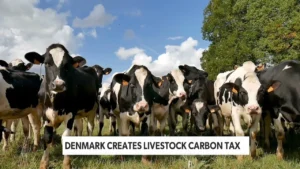
Denmark’s Livestock Carbon Tax
min read
Christina Thompson (Anchor, EarthxNews): Denmark’s government makes history as it issues the world’s first carbon tax on livestock.
Lawmakers say the levies are set to take effect in 2030 and come just months after farmers across Europe protested against a number of the EU’s environmental policies. Alex Salvi has that story.
Alex Salve (Correspondent, EarthxNews): Denmark is finalizing a first of its kind tax, one that takes aim at greenhouse emissions coming directly from livestock. Farmers will have to pay nearly $100 per year for each animal in addition to about $20 per ton of carbon dioxide emitted. The policy, set to go into effect beginning in the year 2030, is part of a new environmental approach in Europe now spearheaded in Denmark. The decision comes in defiance of fierce opposition from farmers across the continent who took to the streets over recent months arguing regulations from their governments and bureaucrats in Brussels are threatening their livelihoods.
They’ve been able to successfully negotiate some of their demands but it’s become clear that cracking down on the agriculture industry, which produces around a third of all greenhouse gas emissions is a priority for European leaders. As heads of state gathered in Brussels back in June to select new European Union leadership positions, the Danish Prime Minister made it clear that addressing the environment was still a top priority.
Mette Frederiksen (Prime Minister of Denmark): We have a lot of challenges in front of us, especially on migration, climate change. We still need a social balanced European union, and we need to have a stronger Europe in the future. So with all these challenges and all the decisions in front of us, I think it’s important that we make a decision as as fast as and as quick as possible.
Salve: Officials in Denmark say there will still be tax breaks for farmers who comply with the new policy in order to alleviate some of the burden—with any revenue generated by the tax going to the industry’s green transition. Prime Minister Fredericksen says she hopes this is just the start of a larger movement, one where the Nordic country paves the way for a similar tax that will take shape in neighboring countries and eventually around the world.
